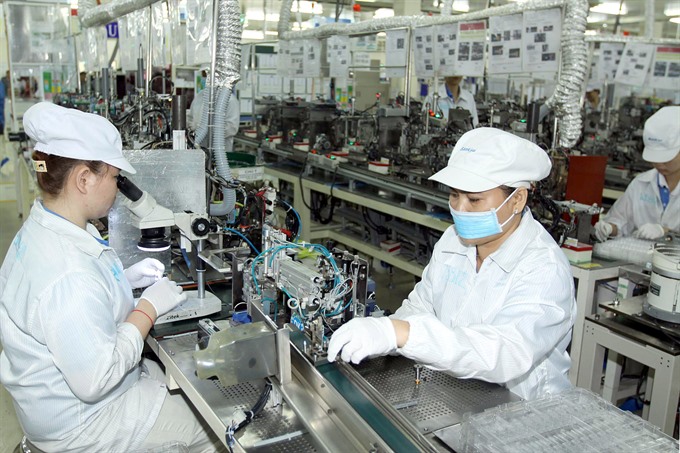Human resources training needs improvement
 |
| Manufacturing electronic components at the Japan-based Nidec Sankyo Ltd Co in the Saigon Hi-tech Park in HCM City. - VNA/VNS Photo Thanh Vũ |
To prepare for the new wave, many businesses have invested in buying modern machines and equipment and in training human resources. But in the Saigon Hi-tech Park, for example, high-tech firms still lack qualified staff to meet their demand. Deputy Director of the park Lê Thành Nhân said businesses in the park need workers capable of operating modern equipment and technology.
CEO of the Meetech Technology Joint Stock Company Phạm Bá Khiển said the number of high-quality workers who could map out ideas or operate modern equipment was limited. They mostly come from universities, but the rate of applied research for start-ups was low, he said.
Nguyễn Văn Thụ, chairman of the Việt Nam Association of Mechanical Industry, said at a recent conference in Hà Nội that investing in human resources should be considered the most important task for local manufacturers, in addition to fostering technical innovation and enhancing co-operation among businesses to maximise efficiency and avoid overlapping investments.
To deal with the problem, the Training Centre of the Saigon Hi-tech Park has supported businesses in training workers to meet their demands for high-quality human resources.
Experts also warn that besides focusing on training high-quality human resources, it is also necessary to upgrade or reform training programmes and methods so that employees can meet the demands of Industry 4.0.
Trần Quang Binh from the HCM City Technical and Economic College said demands for a high-tech workforce were growing, while well-trained human resources supply capacity was limited.
Targeting demand
Head of HCM City Economic College Lâm Văn Quản said the labour market would face a serious gap between supply and demand. Vocational training must equip learners with basic skills and knowledge, together with creative thought and ability to adapt to challenges and jobs’ requirements.
Vocational training centres should strongly renovate from training activities to school management to “create” workers who are capable of working in a competitive and creative environment, he said.
Old training methods that targeted supply instead of demand are an obstacle to this reform, he said.
In response to rapid technological change, the General Department of Vocational Training said virtual training and digitalising education would be the trend of vocational training in the near future. Centres should shift to the models of training that the market needs, according to the department.
Experts say one of the most reasonable solutions for improving workforce quality is to co-operate with businesses.
Đặng Thị Nhật Minh from the HCM City-based Lý Tự Trọng Technical College says vocational training schools should co-operate with businesses and scientists to analyse socio-economic conditions and build appropriate training models.
Businesses regularly invest in new equipment and employ professional and skilled experts, both of which could be placed at the disposal of students, he said. Students would also have opportunities to work and practice in a real working environment and directly learn from experts so their training meets business demand.
Minh Nguyên Logistics Joint Stock Company in HCM City, for example, has worked with universities to select qualified graduates. The company also regularly co-ordinates with strategic partners from the Republic of Korea and Japan to organise training courses for management staff and high-quality engineers.
What the stars mean:
★ Poor ★ ★ Promising ★★★ Good ★★★★ Very good ★★★★★ Exceptional
Latest News
More News
- Congratulations from VFF Central Committee's int’l partners to 14th National Party Congress (January 25, 2026 | 09:46)
- List of newly-elected members of 14th Political Bureau announced (January 23, 2026 | 16:27)
- 14th Party Central Committee unanimously elects To Lam as General Secretary (January 23, 2026 | 16:22)
- List of members of 14th Party Central Committee announced (January 23, 2026 | 09:12)
- Highlights of fourth working day of 14th National Party Congress (January 23, 2026 | 09:06)
- Press provides timely, accurate coverage of 14th National Party Congress (January 22, 2026 | 09:49)
- Press release on second working day of 14th National Party Congress (January 22, 2026 | 09:19)
- Minister sets out key directions to promote intrinsic strength of Vietnamese culture (January 22, 2026 | 09:16)
- 14th National Party Congress: Renewed momentum for OVs to contribute to homeland (January 21, 2026 | 09:49)
- Party Congress building momentum for a new era of national growth (January 20, 2026 | 15:00)
















 Mobile Version
Mobile Version